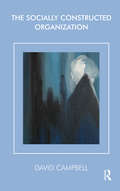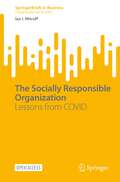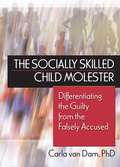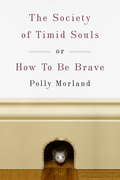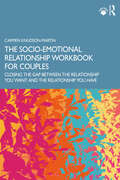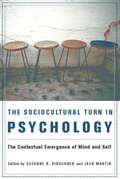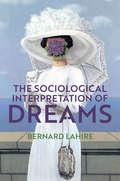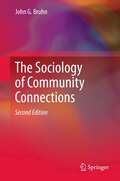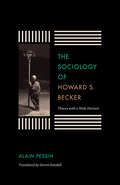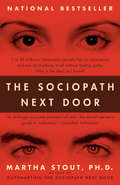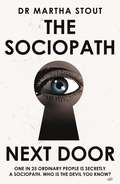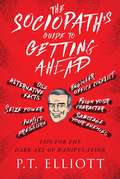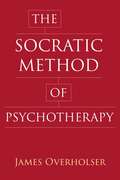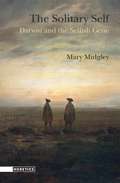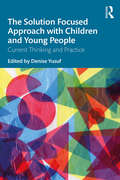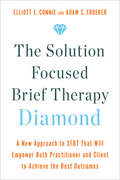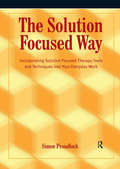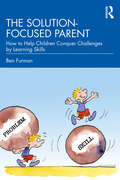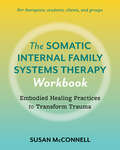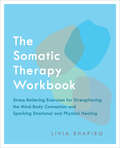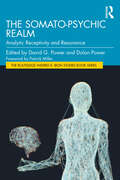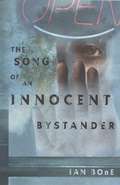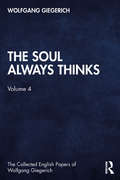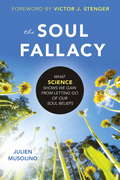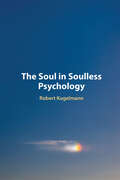- Table View
- List View
The Socially Constructed Organization (The Systemic Thinking and Practice Series)
by David CampbellThis book presents the dynamics of organisations from a social constructionist viewpoint, taking the organisation as something that is constructed continuously through individual interactions with others, both within and without the organisation.
The Socially Responsible Organization: Lessons from COVID (SpringerBriefs in Business)
by Ian I. MitroffThis book explores the nature of the socially responsible organization, specifically the role of crisis management in creating a socially responsible organization. It applies the Myers-Briggs Personality Typology (MBPTI) and the Thomas-Kilmann Conflict Framework to issues such as responses to the COVID-19 pandemic, regulation of tech companies, and infrastructure. Dr. Mitroff lists the major arguments given in regards to these issues and subjects them to the strongest possible scrutiny and critique to hold both individuals and organizations accountable to the larger responsibilities we share as global citizens. This is an open access book.
The Socially Skilled Child Molester: Differentiating the Guilty from the Falsely Accused
by Carla Van DamKnow what signs indicate a child molester!Revealing the secret but successful strategies used by child molesters allows adults to intervene long before children are abused. The Socially Skilled Child Molester: Differentiating the Guilty from the Falsely Accused identifies how socially proficient molesters successfully ingratiate themselves into families and communities. The book closely examines their techniques and strategies while detailing the tools for prevention. The difficult issue of false accusation is tackled by learning the distinctions that clearly differentiate the actions of the guilty from those who are innocent. Practical recommendations for accurately assessing danger and managing safety are provided. The Socially Skilled Child Molester focuses on the sexual deviants who 'groom' family, friends, and their community to allow their activities, though arousing suspicion, to go on without restriction. This essential source reveals their tactics. Using composite representations of various types of child molesters, the author illustrates through case history and detailed research how these offenders succeed, while providing recommendations on how communities can stop enabling and protecting such individuals. The Socially Skilled Child Molester discusses in depth: ’groomers’ versus ’grabbers’ common misperceptions about child molesters the groomer profile—the different types groomer strategies for manipulation correctly differentiating between pedophiles and the falsely accused predicting risk the key concerns when interviewing child molesters the three levels of child molesters recidivism for the sexual deviant. The Socially Skilled Child Molester comprehensively brings together helpful strategies and vital information essential for parents, lawmakers, police, teachers, and therapists.
The Society of Timid Souls
by Polly MorlandA journey into the modern life of an ancient virtue - bravery - and a quest to understand who might possess it and how With The Society of Timid Souls, or How To Be Brave, documentary filmmaker Polly Morland sets out to investigate bravery, a quality that she has always felt she lacked. The book takes inspiration from a vividly eccentric, and radical, self-help group for stage-frightened performers in 1940s Manhattan, which coincided with the terrifying height of World War II and was called The Society of Timid Souls. Seventy years later, as anxiety about everything from terrorism to economic meltdown continues, Morland argues that courage has become a virtue in crisis. We are, she says, all Timid Souls now. Despite a career in which she has filmed in rebel-held Colombian jungles and at the edge of Balkan mass graves, interviewing convicted murderers, drug-traffickers, and terrorists, Morland herself has never felt brave. Often, the very reverse. So she sets out to discover how and why courage is achieved in an age of anxiety and whether it might even be learned. Drawing on her interviews and encounters with soldiers and civilians, bullfighters and big-wave surfers, dissidents fighting for freedom and cancer patients fighting for their lives, Morland examines bravery across the spectrum: from the first childhood act of defiance by Bernard Lafayette, a leader of the civil rights movement who later faced down the KKK in Alabama, or the reflexive will-to-survive of Vjollca Berisha, a Kosovo Albanian who endured a massacre by playing dead among the bodies of her own family, to the small acts of everyday bravery that quietly punctuate our lives, in schoolyards, labor wards, and hospices the world over. Along the way, Morland draws attention to some of the myths of bravery that have been conjured and perpetuated over time and argues that, often, courage exists as much in the telling as in the doing. At once an exploration of what bravery means and a chronicle of the author's personal journey among those who embody it, The Society of Timid Souls is a profound, approachable meditation on this most valued and mysterious of human qualities. In setting off on the trail of the lionhearted, Polly Morland finds out a great deal about what makes some of us extraordinary, and what of the extraordinary we all share.From the Hardcover edition.
The Socio-Emotional Relationship Workbook for Couples: Closing the Gap Between the Relationship You Want and the Relationship You Have
by Carmen Knudson-MartinThis supportive and empowering guide helps readers identify and build on their relational values, which the dominant culture tends to minimize, inhibit, or disparage.Written in an engaging, easy to read and use format, this workbook offers clear case examples and activities that readers can apply to their own relationships. The introductory chapter describes the problem––how unrecognized power imbalances in who notices, accommodates, and attends to one another make attaining satisfying, mutually supportive intimate relationships difficult. Chapters 2-5 introduce practices that help readers recognize the connections between their social worlds and how they engage in their relationships, with exercises that facilitate this personal awareness and enable them to share these experiences with their partners. Chapters 6-10 guide readers through assessing reciprocity in their relationships and exercises to apply each of the four components of the Circle of Care (mutual vulnerability, attunement, influence, and relational responsibility) and strategies for maintaining commitment to their relational goals over the long term. In each chapter, exercises are structured to first teach personal socio-emotional awareness, followed by relational practices that facilitate engagement based on mutual attunement and shared commitment rather than debate.This book views emotion and meaning as the link between individuals and the larger society and helps readers develop awareness of their social contexts and societal power processes that work against relationships.
The Sociocultural Turn in Psychology: The Contextual Emergence of Mind and Self
by Jack Martin Suzanne KirschnerThe sociocultural turn in psychology treats psychological subjects, such as the mind and the self, as processes that are constituted, or "made up," within specific social and cultural practices. In other words, though one's distinct psychology is anchored by an embodied, biological existence, sociocultural interactions are integral to the evolution of the person.Only in the past two decades has the sociocultural turn truly established itself within disciplinary and professional psychology. Providing advanced students and practitioners with a definitive understanding of these theories, Suzanne R. Kirschner and Jack Martin, former presidents of the American Psychological Association's Division of the Society for Theoretical and Philosophical Psychology, assemble a collection of essays that describes the discursive, hermeneutic, dialogical, and activity approaches of sociocultural psychology. Each contribution recognizes psychology as a human science and supports the individual's potential for agency and freedom. At the same time, they differ in their understanding of a person's psychological functioning and the best way to study it. Ultimately the sociocultural turn offers an alternative to overly biological or interiorized theories of the self, emphasizing instead the formation and transformation of our minds in relation to others and the world.
The Sociological Interpretation of Dreams
by Bernard LahireFor Freud, dreams were the royal road to the unconscious: through the process of interpretation, the manifest and sometimes bewildering content of dreams can be traced back to the unconscious representations underlying it. But can we understand dreams in another way by considering how the unconscious is structured by our social experiences? This is hypothesis that underlies this highly original book by Bernard Lahire, who argues that dreams can be interpreted sociologically by seeing the dream as a nocturnal form of self-to-self communication. Lahire rejects Freud’s view that the manifest dream content is the result of a process of censorship: as a form of self-to-self communication, the dream is the symbolic arena most completely freed from all forms of censorship. In Lahire’s view, the dream is a message which can be understood only by relating it to the social world of the dreamer, and in particular to the problems that concern him or her during waking life. As a form of self-to-self communication, the dream is an intimate private diary, providing us with the elements of a profound and subtle understanding of who and what we are. Studying dreams enables us to discover our most deep-seated and hidden preoccupations, and to understand the thought processes that operate within us, beyond the reach of our volition. The study of dreams and dreaming has largely been the preserve of psychoanalysis, psychology and neuroscience. By showing how dreams are connected to the lived experience of individuals in the social world, this highly original book puts dreams and dreaming at the heart of the social sciences. It will be of great value to students and scholars in sociology, psychology and psychoanalysis and to anyone interested in the nature and meaning of dreams.
The Sociology of Community Connections
by John G. BruhnMany of our current social problems have been attributed to the breakdown or loss of community as a place and to the fragmentation of connections due to an extreme value of individualism in the Western world, particularly in the United States. Not all scholars and researchers agree that individualism and technology are the primary culprits in the loss of community as it existed in the middle decade of the 20th century. Nonetheless, people exist in groups, and connections are vital to their existence and in the daily performance of activities. The second edition of the Sociology of Community Connections will identify and help students understand community connectedness in the present and future.
The Sociology of Howard S. Becker: Theory with a Wide Horizon
by Steven Rendall Alain PessinHoward S. Becker is a name to conjure with on two continents —in the United States and in France. He has enjoyed renown in France for his work in sociology, which in the United States goes back more than fifty years to pathbreaking studies of deviance, professions, sociology of the arts, and a steady stream of books and articles on method. Becker, who lives part of the year in Paris, is by now part of the French intellectual scene, a street-smart jazz pianist and sociologist who offers an answer to the stifling structuralism of Pierre Bourdieu. French fame has brought French analysis, including The Sociology of Howard S. Becker, written by Alain Pessin and translated into English by Steven Rendall. The book is an exploration of Becker’s major works as expressions of the freedom of possibility within a world of collaborators. Pessin reads Becker’s work as descriptions and ideas that show how society can embody the possibilities of change, of doing things differently, of taking advantage of opportunities for free action. The book is itself a kind of collaboration—Pessin and Becker in dialogue. The Sociology of Howard S. Becker is a meeting of two cultures via two great sociological minds in conversation.
The Sociopath Next Door: The Ruthless versus the Rest of Us
by Martha StoutWho is the devil you know? <P><P> Is it your lying, cheating ex-husband? Your sadistic high school gym teacher? Your boss who loves to humiliate people in meetings? The colleague who stole your idea and passed it off as her own? <P> In the pages of The Sociopath Next Door, you will realize that your ex was not just misunderstood. He's a sociopath. And your boss, teacher, and colleague? They may be sociopaths too. <P> We are accustomed to think of sociopaths as violent criminals, but inThe Sociopath Next Door, Harvard psychologist Martha Stout reveals that a shocking 4 percent of ordinary people--one in twenty-five--has an often undetected mental disorder, the chief symptom of which is that that person possesses no conscience. He or she has no ability whatsoever to feel shame, guilt, or remorse. One in twenty-five everyday Americans, therefore, is secretly a sociopath. They could be your colleague, your neighbor, even family. And they can do literally anything at all and feel absolutely no guilt. <P> How do we recognize the remorseless? One of their chief characteristics is a kind of glow or charisma that makes sociopaths more charming or interesting than the other people around them. They're more spontaneous, more intense, more complex, or even sexier than everyone else, making them tricky to identify and leaving us easily seduced. Fundamentally, sociopaths are different because they cannot love. Sociopaths learn early on to show sham emotion, but underneath they are indifferent to others' suffering. They live to dominate and thrill to win.<P> The fact is, we all almost certainly know at least one or more sociopaths already. Part of the urgency in reading The Sociopath Next Door is the moment when we suddenly recognize that someone we know--someone we worked for, or were involved with, or voted for--is a sociopath. But what do we do with that knowledge? To arm us against the sociopath, Dr. Stout teaches us to question authority, suspect flattery, and beware the pity play. Above all, she writes, when a sociopath is beckoning, do not join the game. <P> It is the ruthless versus the rest of us, and The Sociopath Next Door will show you how to recognize and defeat the devil you know.
The Sociopath Next Door: The Ruthless versus the Rest of Us
by Martha StoutWHO IS THE DEVIL YOU KNOW? Is it your lying, cheating ex-husband?Your sadistic high school gym teacher?Your boss who loves to humiliate people in meetings?The colleague who stole your idea and passed it off as her own?In the pages of The Sociopath Next Door, you will realize that your ex was not just misunderstood. He's a sociopath. And your boss, teacher, and colleague? They may be sociopaths too.We are accustomed to think of sociopaths as violent criminals, but in The Sociopath Next Door, Harvard psychologist Martha Stout reveals that a shocking 4 percent of ordinary people- 1 in 25 - has an often undetected mental disorder, the chief symptom of which is that that person possesses no conscience. He or she has no ability whatsoever to feel shame, guilt, or remorse. One in 25 everyday people, therefore, is secretly a sociopath. They could be your colleague, your neighbour, even family. And they can do literally anything at all and feel absolutely no guilt.How do we recognize the remorseless? One of their chief characteristics is a kind of glow or charisma that makes sociopaths more charming or interesting than the other people around them. They're more spontaneous, more intense, more complex, or even sexier than everyone else, making them tricky to identify and leaving us easily seduced. Fundamentally, sociopaths are different because they cannot love. Sociopaths learn early on to show sham emotion, but underneath they are indifferent to others' suffering. They live to dominate and thrill to win.The fact is, we all almost certainly know at least one or more sociopaths already. Part of the urgency in reading The Sociopath Next Door is the moment when we suddenly recognize that someone we know - someone we worked for, or were involved with, or voted for - is a sociopath. But what do we do with that knowledge? To arm us against the sociopath, Dr Stout teaches us to question authority, suspect flattery, and beware the pity play. Above all, she writes, when a sociopath is beckoning, do not join the game.It is the ruthless versus the rest of us, and The Sociopath Next Door will show you how to recognize and defeat the devil you know.
The Sociopath's Guide to Getting Ahead: Tips for the Dark Art of Manipulation
by P. T. ElliottCan you be manipulative or irresponsible? Do you occasionally experience a lack of guilt or empathy? Can you be impulsive and feel a need for excitement? Well, these traits are the hallmarks of the sociopath inside you, and it’s time to embrace it! The time to unleash your inner sociopath has never been more right—just look at today’s world leaders and most popular personalities. And it’s time to get yours. Shoot up the promotional ladder and become the predator at the top of the corporate food chain with The Sociopath’s Guide to Getting Ahead. Find the perfect job for the sociopath in you, fabricate your resume to perfection, and manufacture the perfect first impression to ace those interviews. Prey on the biases and manipulate the psychology of your coworkers to break them down. Engineer conflict, manipulate the flow of attention, and seize power for yourself. Play the office party to perfection. Learn how to fake naturalness, make the right allies, and take down your enemies. And take it all the way to the bank. A scathing, tongue-in-cheek take on Dale Carnegie's How to Win Friends and Influence People, the self-help industry, and our world today, featuring cameos by Dostoyevsky, Plato, Robert Greene, Malcolm Gladwell and many others, The Sociopath’s Guide to Getting Ahead is the practical satire we need.
The Socratic Method of Psychotherapy
by James OverholserAs the field of psychotherapy focuses more on treatment manuals and the regimented nature of clinical research, the practice risks losing the subtle nuances that guide the interactive fluidity of therapy sessions. Can clinicians combat this loss by incorporating ideals from ancient philosophy into contemporary psychotherapy? In The Socratic Method of Psychotherapy, James Overholser approaches cognitive therapy through the interactive dialogues of Socrates, aiming to reduce the gap between theory and practice. Clinicians and students will appreciate the flexibility and creativity that underlie effective psychotherapy sessions when guided by the Socratic method as an innovative approach to self-exploration.
The Solitary Self: Darwin and the Selfish Gene
by Mary MidgleyRenowned philosopher Mary Midgley explores the nature of our moral constitution to challenge the view that reduces human motivation to self-interest. Midgley argues cogently and convincingly that simple, one-sided accounts of human motives, such as the 'selfish gene' tendency in recent neo-Darwinian thought, may be illuminating but are always unrealistic. Such neatness, she shows, cannot be imposed on human psychology. She returns to Darwin's original writings to show how the reductive individualism which is now presented as Darwinism does not derive from Darwin but from a wider, Hobbesian tradition in Enlightenment thinking. She reveals the selfish gene hypothesis as a cultural accretion that is just not seen in nature. Heroic independence is not a realistic aim for Homo sapiens. We are, as Darwin saw, earthly organisms, framed to interact constantly with one another and with the complex ecosystems of which we are a tiny part. For us, bonds are not just restraints but also lifelines.
The Solution Focused Approach with Children and Young People: Current Thinking and Practice
by Denise YusufThe Solution Focused Approach with Children and Young People: Current Thinking and Practice brings together leading figures and innovative practitioners from different professions, contexts and countries to provide a unique overview of Solution Focused work with children and young people. Presenting a range of applications in individual, group and community work, it puts the spotlight on diverse fields, exploring how the Solution Focused approach can work in real-world contexts. This book showcases a powerful, engaging approach which helps children and young people find the resources and strengths to manage difficulties and make the most of their lives. It contains interesting case studies, narrative descriptions of original practice, programmes of work developed using Solution Focused principles, and thought-provoking discussions of key elements of practice. With chapters presenting perspectives from coaching, therapy, consultancy and education, and applications including learning assessments, child protection, bereavement, edge of care, and youth offending, the book provides an overview of the current state of practice and provides pointers to potential new developments. The Solution Focused Approach with Children and Young People will help both experienced practitioners and those new to the approach to develop and update their knowledge and skills, as well as introducing them to creative and cutting-edge tools to inspire fresh ideas and thinking. It will be essential reading for Solution Focused practitioners and students, as well as coaches, social workers, school counsellors and mental health professionals working with children and young people.
The Solution Focused Brief Therapy Diamond: A New Approach to SFBT That Will Empower Both Practitioner and Client to Achieve the Best Outcomes
by Elliott E. Connie Adam S. FroererA guide for clinicians (both beginner or seasoned professional) to understand the philosophy and practical steps of Solution Focused Brief Therapy (SFBT) to maximize their effectiveness with any client, written by two respected and innovative experts in the field.Solution focused brief therapy (SFBT) is a therapeutic approach that focuses on the client&’s hoped-for future instead of their ongoing problems. Elliott E. Connie and Adam S. Froerer are the founders of The Solution Focused Universe and are two of the most respected and innovative experts in their field. Together, they have developed the Diamond model—a framework of SFBT skills and tools designed to guide a clinician through each session of therapy—which is one of the biggest innovations in the field of solution focused brief therapy.This is a practical guide for any clinician (beginner or seasoned professional) to understand the philosophy and practical steps of conducting an SFBT session. Among the topics discussed:How to presuppose the best in your client How to trust your client&’s capabilityThe stance clinicians should adopt to be effective solution focused practitionersThe art of asking meaningful questionsThe importance of autonomyThis book also includes tools to help practitioners implement this approach, including a complete SFBT session with editorial comments that illustrate the thinking that goes into constructing a session, as well as 101 solution focused questions that practitioners can use.Connie and Froerer see their Diamond model as life-changing for all parties involved. They write, &“This work is transformative not only for clients but also for you. When you view your clients as capable and strong, it changes you—and how you do your job. Your perceptions directly impact your actions.&”
The Solution Focused Way: Incorporating Solution Focused Therapy Tools and Techniques into Your Everyday Work
by Simon ProudlockThis is a comprehensive step-by-step guide to incorporating solution focused techniques into everyday practice. Solution focused therapy helps clients to identify how their lives would be without their problems by exploring current client resources and strengths, and their hopes for the future. Instead of dissecting the problem, it looks at what is different when the problem isn't happening or is less severe. These times are the building blocks of solutions. Solution focused methodology is increasingly used within community mental health teams, mental health charities, inpatient settings, education and business, as it is a well-structured and demonstrably effective approach. This book provides: guidance for practitioners to gain the skills they need to move from problem focused work to searching for solutions; a comprehensive step-by-step guide to using solution focused techniques and integrating them into existing practice; a brief review of the evidence base on solution focused therapy; ample exercises to give to clients to help them move away from their problems to finding solutions; and, clear instructions on how to adapt these techniques for specific populations such as individuals with substance misuse problems, individuals in crisis, anger management and working with couples. This is a very clear and practical guide to using solution focused brief therapy in everyday practice and will be invaluable for all practitioners wanting to incorporate these techniques into their work.
The Solution-focused Parent: How to Help Children Conquer Challenges by Learning Skills
by Ben FurmanThis practical book presents readers with a skills-based, child rearing approach to supporting a child’s growth and helping them overcome both minor and major developmental challenges. In contrast to conventional approaches to child psychology, this innovative approach focuses on developing children’s abilities rather than concentrating on and trying to fix their “problems.” Additionally, instead of blaming caretakers for their child’s challenges, the skills approach offers them the keys with which they can coach and motivate their children to overcome challenges by learning required skills. Readers will find it easy to grasp the idea of the skills mindset through the book’s wealth of eye-opening stories, case examples, and the author’s personal insights as a psychotherapist, parent, and creator of the Kids’Skills method. Clear, detailed instructions will help readers immediately put the ideas into everyday practice with their own children and families. This book is a must-have, hope-instilling toolbox for anyone involved in the task of raising a child. Parents, grandparents, teachers, mental health professionals, and more will find this a valuable resource in ensuring the future success of the children in their lives.
The Somatic Internal Family Systems Therapy Workbook: Embodied Healing Practices to Transform Trauma--For therapists, students, clients, and groups
by Susan McConnellThe companion workbook to Somatic Internal Family Systems Therapy—a practical guide to the 5 pillars of embodied IFS for trauma therapists, Somatic Experiencing™ practitioners, and mental health healersWith embodied exercises, foundational knowledge, and practical guidance, The Somatic Internal Family Systems Therapy Workbook shows therapists and clinicians how to embody the five practices of Somatic IFS: somatic awareness, conscious breathing, radical resonance, mindful movement and attuned touch.Each works together to facilitate trauma healing with clients and build embodied safety, integrate unresolved harm, and develop the ability to name, process, and understand emotional and somatic sensations. The workbook opens by inviting the therapist to explore their own Internal System, offering an embodied approach to experiencing the model. Chapter 1 explores and explains foundational concepts like somatics; embodiment; Parts; Self; and the cultural influences that shape and shift our embodied experiences. Chapters 2 - 6 move into theoretical grounding, clinical applications, and practical exercises for each of the five principles. They offer tools to:Develop clients' ability to name, describe, and convey sensationsRecognize and track for signs of client overwhelmWork with Parts that fear body awarenessUnderstand the purpose and clinical benefits of conscious breathingRestore the Embodied Self Explore therapeutic shifts from doing to to being with clientsHeal attachment woundsIntegrate mindful movement into healing developmental traumaUnderstand and practice attuned touchEach practice is designed to be used whenever it will be of benefit: the tools and exercises are non-linear and adaptable, and aren&’t limited by a prescriptive sequence. The workbook also explores links between current psychotherapeutic practice and ancient healing modalities, grounding SIFS in a larger web of effective somatic trauma healing and embodiment approaches.
The Somatic Therapy Workbook: Stress-Relieving Exercises for Strengthening the Mind-Body Connection and Sparking Emotional and Physical Healing
by Livia ShapiroRelease tension and heal from traumatic experiences with therapist-approved activities in this easy-to-use guide to somatic therapy.Enjoy a great reading experience, with a $3 credit back to spend on your next Great on Kindle book when you buy the Kindle edition of this book. The effects of a traumatic event are more than just mental. Trauma can manifest in the body as chronic pain, sluggishness, and even depressed mood. Somatic psychology is an alternative therapy that analyzes this mind-body connection and helps you release pent-up tension and truly heal from past trauma. The Somatic Therapy Workbook offers a primer to this life-changing approach as a means for personal growth, designed for beginners or those already using somatic techniques in their current therapeutic process. Ideal for those suffering from PTSD and other trauma-based afflictions, this safe and approachable look at somatic therapy includes: - journal exercises - body-centered prompts for personal inquiry - movement exercises - real-life experiments Discover a new ability to process and accept your emotions—and an understanding of how to live a somatically-oriented and embodied life.
The Somato-Psychic Realm: Analytic Receptivity and Resonance (The Routledge Wilfred R. Bion Studies Book Series)
by David G. PowerInfluenced by the groundbreaking work of Wilfred Bion, The Somato-Psychic Realm: Analytic Receptivity and Resonance sees 10 internationally acclaimed psychoanalysts explore the complex interrelationship between our psychic and somatic selves, and highlight its promising riches and devastating disruptions.Explored theoretically and illustrated with vivid clinical examples, the contributors in this volume map our current understanding on the fascinating subject of psychic and somatic selves, reframing it as the ‘somato-psychic realm’. This collection of essays brings together the current thinking, reflections, and clinical understanding of prominent Bionian psychoanalytic practitioners and scholars, from Rudi Vermote to Judy Eekhoff, each of whom have developed particular interests and expertise in analytically approaching the realm of the somato-psychic. The reader is offered extensions of theory and vivid clinical examples and invited to consider many questions central to contemporary psychoanalytic practice: Does the body think and if so, how does the analyst converse with it? Is thinking in a psychoanalytic sense best conceived of as a combined function of the soma and psyche? How does this perspective reorient analytic technique? Can we conceptualise a body-to-body dimension of the analytic experience, and in the analytic encounter how does this dimension serve a vitalising function for the patient while remaining outside of the usual verbal and symbolising exchanges between analyst and patient? What is the fate of failures and disruptions in the somato-psychic interrelationship and how does the analyst hear, recognise, and respond to these failures? How does the analyst make subjective space to experience in herself the presence of these disruptions? What transformations in our technical stance does this type of clinical presentation require? As they approach the challenges of the somato-psychic realm, readers will find themselves drawn into this conversation, invited by a thought-provoking foreword by Patrick Miller.It will be a vital resource for psychoanalysts in training and practice alike looking for a greater recognition of and ability to respond to problems ranging from frank somatic disorders to failures in symbolisation and thought process and the non-neurotic states of mind that accompany these disorders.
The Song Of An Innocent Bystander
by Ian BoneWhen she was nine-years-old, Freda walked into an underground restaurant and straight into a terrifying ordeal & for thirty-six hours she was at the mercy of a deranged gunman. While her parents waited outside, Freda allied herself with the one person who could possibly save her & the gunman. Ten years later, a newspaper reporter is seeking the truth about Freda. He knows about the writing on the napkins. What really happened down there? This young-adult novel hooks readers from its first riveting page and keeps them guessing up to the shocking finish.
The Soul Always Thinks: Volume 4 (The Collected English Papers of Wolfgang Giegerich)
by Wolfgang GiegerichC. G. Jung regarded the soul to be a reality in its own right which reflects itself in all manner of images and events. symbols and traditions. In this fourth volume of his Collected English Papers, Giegerich recalls the soul to the inwardness of its own home territory by bringing out the thought-character of the self-creating, self-unfolding logical life that it is. In addition to clarifying what thought means for psychology and analyzing certain misconceptions surrounding the topic of "soul and thought" a challenging thesis concerning the limitation of an imaginal, "anima-only" approach in psychology (given the essential historicity of the soul) is carefully argued, while examining at the same time such topics as "the end of meaning and the birth of man," "anima mundi and time", "the metamorphosis of the gods," and the logical steps involved in the transition from childhood to adulthood and from a psychological oneness with nature to modern alienation from nature. The book also discusses the notion of the soul’s logical life and shows in action the psychological procedure of "absolute-negative interiorization" of phenomena into their soul and truth in a number of in-depth examinations of particular phenomena (e.g. Heraclitus’ dictum about the soul’s depth, the "leap into the solid stone," the negativity of the "stone which is not a stone"). In thorough-going critical engagements with other authors in the field, it demonstrates specific instances where psychology fails to do its job due to faulty presuppositions, above all psychology’s failure to face the modern world. It emphasizes the active role of the mind in soul-making as the making of psychic reality. It addresses the questions of the future of psychology and whether progress in psychology is possible.
The Soul Fallacy
by Victor J. Stenger Julien MusolinoMost Americans believe they possess an immaterial soul that will survive the death of the body. In sharp contrast, the current scientific consensus rejects the traditional soul, although this conclusion is rarely discussed publicly. In this book, a cognitive scientist breaks the taboo and explains why modern science leads to this controversial conclusion. In doing so, the book reveals the truly astonishing scope and power of scientific inquiry, drawing on ideas from biology, psychology, neuroscience, philosophy, and the physical sciences. Much more than chronicling the demise of the traditional soul, the book explores where soul beliefs come from, why they are so widespread culturally and historically, how cognitive science offers a naturalistic alternative to religious conceptions of mind, and how postulating the existence of a soul amounts to making a scientific claim.Although the new scientific view of personhood departs radically from traditional religious conceptions, the author shows that a coherent, meaningful, and sensitive appreciation of what it means to be human remains intact. He argues that we do not lose anything by letting go of our soul beliefs and that we even have something to gain. Throughout, the book takes a passionate stand for science and reason. It also offers a timely rejoinder to recent claims that science supports the existence of the soul and the afterlife.
The Soul in Soulless Psychology
by Robert KugelmannModern psychology began with a rejection of the 'soul' as relevant for the science. How did that come about? The Soul in Soulless Psychology explores that question and details arguments for a soulless psychology. However, there was also opposition to this notion. This alternative history of psychology examines those who dissented from a 'psychology without a soul,' including Neoscholastic psychologists and others, such as Ladd, Münsterberg, and McDougall. Substitutions for the soul – such as self, personality, and the brain – show that even with the soul absent, its concerns were present. Innovative re-thinkings of the soul are addressed, as well as attempts at restoration of the soul into psychology. Moreover, historical psychologies of the soul kept the soul in view. In the twenty-first century, we find soul as a noun, an adjective, and a verb, all pointing to the necessity of the soul for psychology.
